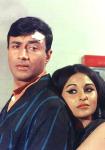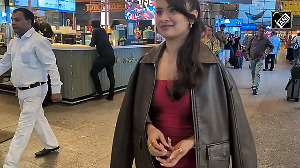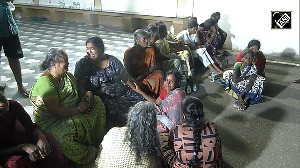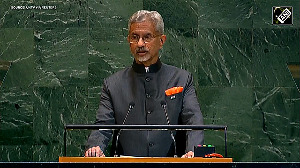Sadanand Menon was a college student when he first met Chandralekha in 1969. In 1975, frustrated with the Emergency, he quit his job as a journalist. Then, he started living in Chandralekha's house. The special friendship continued till she breathed her last on December 30. Menon speaks to Shobha Warrier about Chandralekha -- the dancer and the person.
When did you first meet Chandralekha?
I met Chandra in 1969 if I remember right when I was a student in Chennai studying in Loyola College. I met her along with 20 or 25 other students.
Any particular reason why you decided to meet her?
In college, I was part of a group that was producing a students' journal. And the late '60s was the time of student activism and all of us were concerned about the state of education, the state of society, etc. Once one of the students spoke about the atrocities on poor Dalits in his village and the caste violence there. As a group, we decided to go there and see what was happening. It was the first trip to a village for many of us. We decided to organise food, shelter etc for them. For that, we needed money. One of the students came up with a novel idea of raising funds by barging into the parties organised by the rich. He went to one such party where there were 50-60 people and one was Chandra. He boldly announced what we needed. While all clucked their tongues, Chandra alone laughed out loudly and called this guy aside and gave him a scolding. 'What kind of stupid fools are you? You have no understanding of politics or society. What business do you have to go and interfere in the lives of the poor villagers without knowing what the real situation is? So, grow up and learn your politics before doing such things.'
He felt he had met a fantastic person and urged all of us to meet her. The very next day, 18 of us barged into Chandra's house in Mylapore in Chennai. That was how I met her for the first time.
What was your first impression of her? She must have had black hair at that time
Yes, she had long, black hair. She was a striking personality. Even more striking for the group of students in the age group of 18 and 19 was seeing a single independent woman speak out her mind, mock us and scoff at us! Almost all of us in the group were blown off our feet. To this day, everybody remembers the story. When she spoke, it was like a thick fog was being lifted from our eyes. She put a finger on our limitations.
There was a very interesting poem she had written about living in Chennai which we extracted and published in our students' magazine. We continued to meet her.
What did you discuss with her in the subsequent meetings?
Chandra was always surrounded by important creative people. One immediately understood a different world of creativity which students were not exposed to in the normal course of things.
In what way did such meetings influence you as a student?
At that time, it was the excitement of meeting important creative people that attracted us. There were many questions asked there. We understood that making films also was critical and it is not just an entertainment medium, and that script writing is a specific kind of art. The meetings opened out new windows. The meetings became more frequent and one understood the range of Chandra's interests. One came to know her as a writer, as a poet, as a dancer, as a designer
When did you first see her dance?
I saw her practising dance but saw her dance on stage only much later. By the time I met her in 1969, she had stopped dancing but in 1971, she made a production called Navagraha but as I was studying at the Madras Christian College in Tambaram, I could not watch it. But one kept hearing about it. For two years I could not meet her because I was there. When I met her again, she had stopped dancing once more. She had this interesting history. In 1961, she did her last piece, Devadasi and from 1961-1971, she did not dance in public. In 1971, she did Navagraha. She had another long break till 1984. So, I actually saw her actively dance only around 1984-85.
Why and when did you decide to stay with her? Was it because of admiration?
What shall I say? I was with the Indian Express which was my first job after college. Then, Emergency was declared. One felt there was no future for journalism. I thought the Emergency would continue for 20 years! I decided to do other kinds of writing. I was floating then. I didn't know what direction things would go. Chandra was doing a lot of dance, gender issues and human rights workshops abroad. There was no feminism in India at that point but she was already talking about those issues. She was also actively campaigning against the Emergency. As she was taking those workshops abroad, there would be two or three months during which she would be out of Chennai. There was a fear always of burglary. One day, she said, 'Anyway, you are floating around. While I am away, why don't stay here and look after the place?' That was how it began. Then, I stayed on and we began doing things together. It was one of those unplanned things. That was a friendship that grew.
Was she like a guru to you?
Guru is not a nice word because she hated the idea of being a guru. That was something she told her dancers also. She would tell them, don't touch my feet. I don't want any authority over you. I would rather be a person who works with you. I want to be liked as a friend. So, she hated the idea of guru-ship! The exciting thing about her is that she would do something and by watching it, you would realise that there is a special mind that she was showing and you enter that mind.
When we started working together in 1975, she was a good 25 years older than me. Age apart, she was so far ahead in experience and there was already a halo of greatness around her but she would never accept it. She would still be able to listen to something she thought was special. Like, if you would construct a sentence in a particular manner, she would say, 'I wish I could do that. How do you do it?' She had the ability to respond at every level -- to the housemaid or the milkman. I call it a special kind of openness. She didn't have a closed mind.
Were you in awe of her?
She wouldn't allow that to happen. I have been in awe of certain teachers in school and college. But in Chandra's case, it was none of that; there was a sense of partnership and sense of friendship.
Can we call her a special friend of yours?
Certainly. She was a special friend. There was an element of surprise too. I had done my MA in English literature. I had special interest in certain writers, poetry etc. In some situations, if I quoted Shakespeare, she could surprise you by telling you, 'Oh! King Lear! Macbeth!' Slowly one realised that none of her knowledge was casual. Once she got interested in something, she would pursue it very deeply. Shakespeare, for example. Once she got interested in Shakespeare, she sat one day and it took her 18 days to read through the entire works of Shakespeare. Her intensity was such that she would remember entire passages. It was the same with the newspapers too. I can say I haven't met a news editor who can read a newspaper with as much precision as Chandra could. She had an analytical mind along with memory. I learnt this from her. I call it osmotic.
Do you feel you were lucky to be so close to her?
Honoured. Blessed. I don't know what else to say.
Were your friends jealous of you because you stayed with her and was very close to her?
I don't think so. This is again another interesting thing about Chandra. Everybody seems to know her as intensely as I know her.
But you were close to her
It is just that I was around. It could have been anybody. From roughly December last year, she had difficulty in walking. Until then, her exercise had been going and sitting on the parapet wall on the beach over there. Every day, she would make a new friend. Once that new friend was made, that person would come every day. Yesterday before the funeral, many of these people came who had known her for a few months only and they seemed to express more emotional unhappiness over her passing away than even someone like me who has known her for 35 years. She could touch people with that kind of intensity. Everybody believed she was her or his personal friend.
In the initial years when you started living with her, till 1984 till when she didn't dance, did you discuss dance with her?
On many occasions. She wasn't dancing but was very aware of what was happening in the dance world. She was not dancing on stage but on every second day she would practice. She would put on music and practice. At that time, she was in her mid-fifties yet she had a very good body and she would practice two-three hours at a stretch.
But she refused to dance on stage
She didn't believe in that kind of performance. That she had said in 1961 itself when she left the stage. She said, dance was degenerating and the kind of sabha culture that was growing, the kind of fawning adulation and the false hype around artistes, the kind of organisers of performances like the sabha secretaries.
As much as she was admired and respected as a dancer and choreographer, she was criticised too for the way she looked at the human body. How did she react to such criticism?
Chandra was a dancer but in a sense, she was also a true intellectual. She loved the debate. She loved a good conversation. She had absolutely no problem with people differing with her. Normally whatever she would say would have been done with so much of research work and nothing taken for granted. She would never say, I am doing this because it is traditional. If criticism occurred which had meat in it, then she welcomed it. But if it was what she called opinion, she would not listen.
She shocked many people
People are shocked by many things. And people are not shocked by many things too.
Was she amused when people were shocked?
Partly. There was a sense of amusement. The question would be, was she deliberately out to shock people? This is what she is accused of sometimes, that she was deliberately sensationalising. But I would say if you actually begin to examine your 'traditions', the truth of that would necessarily shock those who live in its comfort. Everything has history, everything has certain beginning and a way it has travelled. If you historicise certain things, many things you believe as good today were probably very violent earlier and so on and forth. She was exploring the truth behind certain things which we accept as beautiful and glorious.
What was the human body to her?
Let's put it this way. A simple thing she used to say often was, 'Human endeavour today is taking us to outer space. We are exploring distances which are far away from us. Often those distances may be imaginary. As far as those distances are outside the human body, same distance exists within the body. You are as far away from your body as you are away from some distance. Your body is full of complexes, your body is full of stratifications of time, stratifications of value systems, of judgments, of dos and don'ts, behavioural modes; there are so many problems with your body that you are at a distance from your body. Walk towards your body.' In workshops, she used to ask people to shed inhibitions and walk towards the body and treat the body as their friend.
The way she used human body in her choreography was described as erotic by many.
Chandra would never run away from the word erotic. For her, it was not a bad word and it was not a pejorative word because she believed that the body is erotic and every sense in the world has erotic movement. So, she believed in the idea of touch and look and feel and sound and taste. Yes, body to her was sensuous and erotic too. Sensuality is often expressed in oneself but erotic often is between two people, and she would not be running away from the idea. In our context, it can be used in the pejorative sense. You label something as erotic and kill it. Or, in some of her works, it is called homo-erotic. In one production of hers, Raga, where a large chunk of time, two men are on stage together and in close proximity. What she was doing was, she was using kalaripayattu massage technique by changing the speed.
Was the human body something to be celebrated?
It was a resource, a friend, energy. She believed in the idea of beauty, not in the abstract sense. If you take the 'body' of her work, all her ten productions, you will see that no other artiste in India who has focused so completely, so thoroughly, so consistently from beginning to the end, on issues of the body, issues of sexuality, issues of sensuality, issues of spirituality as a continuing theme in her work.
Did you disagree with her ideas?
All the time. We used to have major battles.
Was it like that in the beginning of your relationship also, or you started disagreeing after you grew up?
In certain things, it was like that right from the beginning. May be in the beginning, I did not articulate it. I didn't have the methodology. Being with her and absorbing her ideas, one learnt that one could disagree with conviction and in such a way that the conversation grew.
As a person who looked at the human body as a source of energy, how did she respond when her body became weak, and someone had to hold her hand when she walked? Was it painful for you to see her like that?
Sometimes, yes. But the point is, she never ever evoked pity in people. For example, weakness in the body is not something she accepted in the sense of age. Till she had the cardiac bypass in 2001 or 2002, whatever her dancers performed on stage was experimented by her first. She never had any problem telling any one to hold her hand if she had difficulty in walking. She had a way of doing it which was very beautiful. I never felt I was protecting her or something like that. She was completely independent till her last.
Did you two talk about death?
She had lots of stories on death. It was a subject that fascinated her. Aravindan's (Malayalam filmmaker) death affected her very deeply. She had a special friendship with him. Another friend's death in a motor accident was a big shock to her.
Was she scared of death?
No. Her most favourite story was the kind of death she would like to have, the death that Socrates had. He was eventually asked to drink hemlock poison -- the effect of which begins with the foot and eventually claims your mind. She would say that was the kind of conscious death she would like to have had. That was a very important word for her - consciousness.
Was she conscious?
In a sense, yes. She had lost the faculty of speech in the last five weeks but she was conscious. Her eyes were completely focussed and she was very alert. Those who came to console her went back receiving energy. So, consciousness was there. Even when we brought her back home three weeks ago, the house felt full. Yesterday we came back from the cremation ground and the house was full but it still felt empty. That is the very specific quality she had. I would say that was the quality of her consciousness.
Did she believe in life after death?
She was a believer in all those things. She wanted agni sanskar. She believed that life cycles are not linear; but circular. She believed that forces come back in a better way. This is not in the religious sense. For her, it was a beautiful idea. Her entire religion was her aesthetics.





